- Details
-
Published on Friday, 28 November 2014 16:16
Interview with: Wulf
Edited by: T.V.
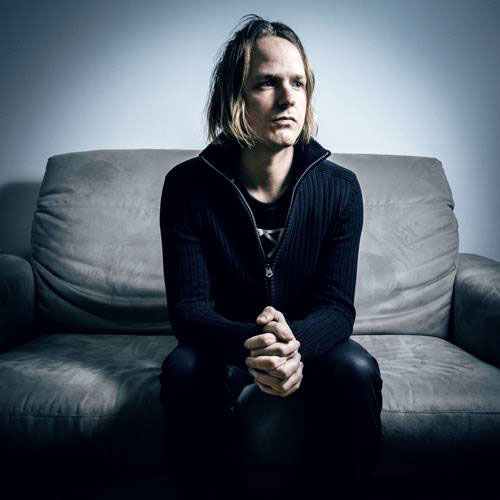 I think that our readers don't need any special introduction into one of the best and most successful, yet most creative atmospheric/electro/cyber metal acts of today - Neurotech. This one-man band coming from Slovenia just released its third full-lenght opus entitled Infra Versus Ultra (read a review over HERE), which once again goes beyond everything done before in the sector of electronic infused metal. By not being really concerned about how the fans will accept his new creations, Wulf, the mainman behind Neurotech is a master in making his music enriched with many different elements that have its origins in futurepop, symphonic music, new age, industrial and even in extreme metal. Neurotech was born back in 2007 and since then made all of his releases available as "name your price" digital downloads at Bandcamp, of course all three full-lenghts have been released also on CD. I meet with Wulf on a very cold day in one of the Ljubljana's bars where while siping coffee, smoking cigaretes and trembling because of coldness, we talked about the new album, future plans, inspirations, live experiences and much more.
I think that our readers don't need any special introduction into one of the best and most successful, yet most creative atmospheric/electro/cyber metal acts of today - Neurotech. This one-man band coming from Slovenia just released its third full-lenght opus entitled Infra Versus Ultra (read a review over HERE), which once again goes beyond everything done before in the sector of electronic infused metal. By not being really concerned about how the fans will accept his new creations, Wulf, the mainman behind Neurotech is a master in making his music enriched with many different elements that have its origins in futurepop, symphonic music, new age, industrial and even in extreme metal. Neurotech was born back in 2007 and since then made all of his releases available as "name your price" digital downloads at Bandcamp, of course all three full-lenghts have been released also on CD. I meet with Wulf on a very cold day in one of the Ljubljana's bars where while siping coffee, smoking cigaretes and trembling because of coldness, we talked about the new album, future plans, inspirations, live experiences and much more.
T.V.: Hi Wulf! Your new album is just released, so please tell me how are you satisfied with the final result, responses from fans, etc?
Wulf: Must say that I'm very satisfied with it and I didn't expect such a response, especially the response to the crowdfunding campaign was really positive. I was a bit concerned about how the fans will accept the new music as it again brings something new, but most of them accepted it more than fine. I find it very good that people are still open for new things and they are not only looking back at the things that were done in the past. I'm very satisfied with the album, yeah, there was a lot of work put into it so I'm pretty worn out now, but in a positive way.
T.V.: You became known by serving with new musical ideas on each new release and I'm interested what's that new thing on Infra Versus Ultra in your opinion?
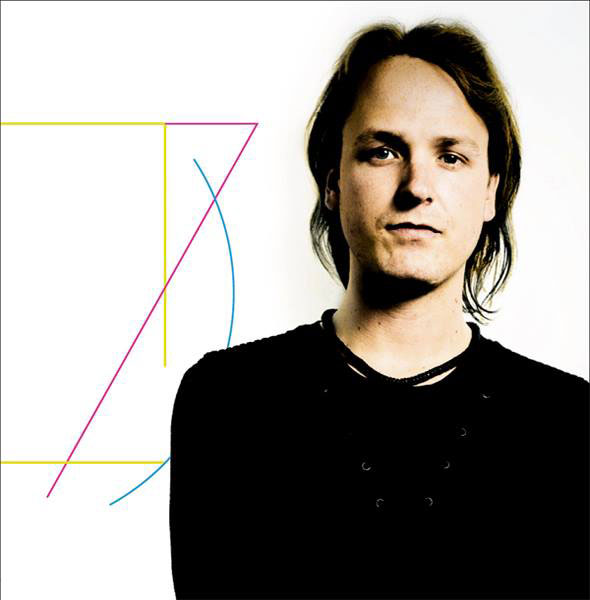 Wulf: There are a lot of new things. First of all there's the sole atmosphere thing. I used a lot of software editions of sounds from the late 70s, early 80s, mostly from pioneers of electronic music like Jean Michel Jarre, Vangelis, but to be honest those two were my huge influences also before. I began with new approaches how to compose the songs, there was a lot of experimentations, still sometimes I used those standard compositional patterns because I like the songs with good refrains and verses with kind of pop attitude, but everything is done on a higher level now. The new album is made like a totality, even those songs that are completely diverse from anything I've done before are well integrated into the structure of the album. The most interesting thing is that there are no more harsh vocals, mostly because I don't listen anymore to that kind of music and I think that in the music I make today harsh vocals don't fit anymore. There was a lot of work just on that, to create harmonized vocals and by that adding a whole new dimension to the songs.
Wulf: There are a lot of new things. First of all there's the sole atmosphere thing. I used a lot of software editions of sounds from the late 70s, early 80s, mostly from pioneers of electronic music like Jean Michel Jarre, Vangelis, but to be honest those two were my huge influences also before. I began with new approaches how to compose the songs, there was a lot of experimentations, still sometimes I used those standard compositional patterns because I like the songs with good refrains and verses with kind of pop attitude, but everything is done on a higher level now. The new album is made like a totality, even those songs that are completely diverse from anything I've done before are well integrated into the structure of the album. The most interesting thing is that there are no more harsh vocals, mostly because I don't listen anymore to that kind of music and I think that in the music I make today harsh vocals don't fit anymore. There was a lot of work just on that, to create harmonized vocals and by that adding a whole new dimension to the songs.
T.V.: I can sense also some influences of 70s art-rock...
Wulf: I grew up with those sounds. My parents were listening a lot to that and since I was six or seven years old I was listening a lot to The Doors, Jethro Tull, Uriah Heep,... to the bands that were making albums like an entirety, who had an advanced approach, a progressive thing with new motives in music, were mixing a lot of different styles, and yeah, I can identify myself with that. I think that a musician must try to make experiments and be inovative.
T.V.: There's no doubt that you were working a lot on the catchiness of the tracks, especially I can sense that in the song "The Longest Time", where I can find also some floydian atmospheres and I know that you are not really a fan of Pink Floyd. How's that?
Wulf: Ha ha, yeah I know, you are right... "The Longest Time" was the first song written for this album and was that necessary click that pushed everything forward. Since this song was done I knew that I must let myself go with that flow and searching for more, right in that style and atmosphere. Then like from nowhere I had 24 songs done, 10 of them were supposed to be on the album and after giving a more analitical listen to it I started to shell out the best things with the most satisfactory content, kind of a x-factor approach haha, which you get after a more devoted - analitical listen.
T.V.: Before releasing Infra Versus Ultra, in a way you closed one artistical chapter with the release of Decipher Volumes. On the second part of it you presented a completely new side of Neurotech by adding female vocals, and I can't lie that I expected something in that direction also on the new album...Wulf: I thought about that, but I always serve the music and I don't want to make forced things. I think that female vocals wouldn't work out that fine this time.
Decipher Vol. 2 was in many ways a pop release, influenced by
Abba,
Roxette, and with kind of true cyber metal stuff if I can say it that way. In its basis it had a need of female voice, a feminine approach to give it the right colours. I was thinking to use female vocals also on
Infra Versus Ultra but when I started to put the things together I felt that this album is too dark for that and I couldn't find the right place for it. I won't say that I'll never again use female vocals but only when I'll find the right and proper place for them. Like I said, I only serve the music and if I'll hear in it the need for feminine approach than of course I'll use that.
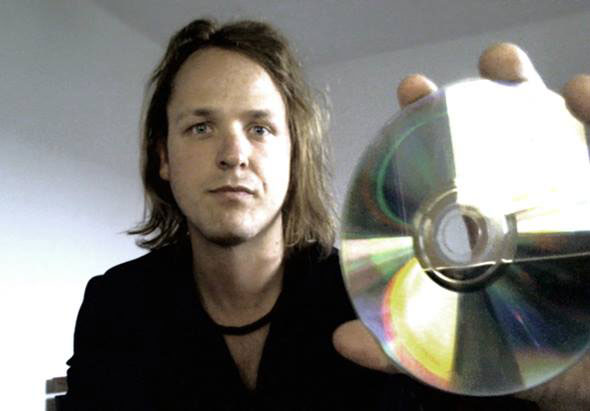 T.V.: And right with the release of Decipher Vol.2 many of your older fans were lost, but at the same time you've gained a lot of new ones. How do you look at this things?Wulf
T.V.: And right with the release of Decipher Vol.2 many of your older fans were lost, but at the same time you've gained a lot of new ones. How do you look at this things?Wulf: This is a natural evolution. Those open minded fans who struggle to hear new things will always remain loyal and I understand that others just wants you to stay in the same corridors like in the beginning when they've discovered you. I think that those who stoped following
Neurotech after
Decipher Vol.2 also with all other future releases won't be satisfied. On the other hand those who remained know and have found out that
Neurotech is not a metal band in the right sense, or better said metal music is not a primary style for Neurotech. Neurotech is a million of things, million of genres, there are so many elements in this music, so those who like only one musical style will never find themselves really comfortable with my music. To say the truth I don't really bother myself with those things, I just go where my artistical evolution drives me.
T.V.: One another interesting thing that came to surface with the releases of Decipher Volumes are cover artworks which from there on follow kind of a similar direction. Is there anykind of communicativeness behind that?Wulf: In fact there is. Since
Decipher Volumes on we got rid of those cheesy photoshoped covers and started working on a kind of complex minimalism. I believe that new cover artworks don't give just by looking at them the impression how the album would sound like, and beside that there are things that are packed somewhere in the background and are holding a subliminal message.
Decipher was from the artistical and designing point of view, with all those shapes and stuff, a constructivistical thing. Design on
Infra Versus Ultra follows similar path but it's packed in kind of a diamond like shape. Everything is symbolic and there's of course some kind of a paralell between them and it's the same as with music, there's a natural evolution also on this side.
T.V.: And what about the title, Infra Versus Ultra? There's as well a lot of symbolism.Wulf: This title is actually quite old. I had it in my mind for some years now and now I was feeling that it will suit best right for this one. Initially I had in mind another title,
Trinity, that was also a working title, but when I got into the context of it I wasn't feeling ok with it anymore. The thematics on
Infra Versus Ultra are about "below versus beyond", about those things that are below against things above. It's dealing also with the experiences from someones past and how you'll deal with them in the present, will you change, fight or accept and learn from them for a
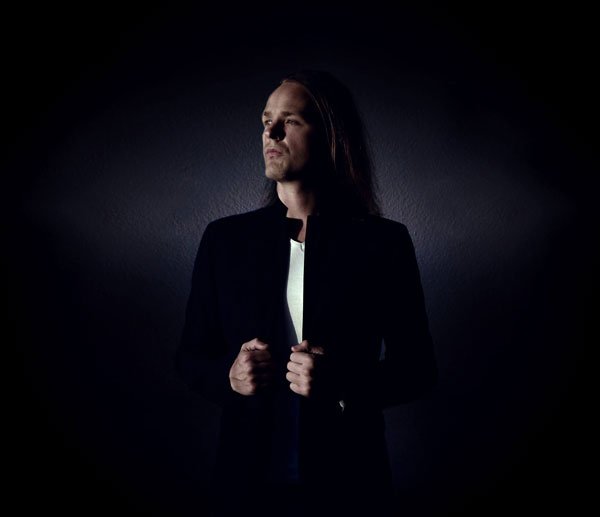
better future. So, we have the three times, past, present and future, which is in a kind of connotation with the title
Infra Versus Ultra; Infra like below or past, versus as the present and Ultra like beyond or future. All three times are connected between them and it's upon each and every one of us how to deal with them, what kind of decisions we will make out of all those experiences, memories and all the things that happened to us, how we will go into the future with all of that... This are the lyrical thematics on which this album is centered about.
T.V.: Very interesting. I also imagined it like a duel between micro and macro, small and big,...Wulf: Yes, of course. Also that is one side of perception. Imagine a golf match... Before you hit a ball with a golf club and you want that ball to reach the goal, there's a deviation between an expert and amateur not more than 2 centimeters of lenght, but the final result is completely different. That can be translated into the whole concept behind the album, small changes that you can make in your life can have huge effect in the final results.
T.V.: And still everything is open to each ones personal explanation and imagination, isn't it?Wulf: Exactly. That's what I wanted after all. I want my album titles and lyrics as well to have kind of universal meanings allowing each one his/her own interpretations. I don't want to be the one preaching something as an absolute truth, but is left to the listener after all to fill up all the blank spaces with his/her thoughts and imaginations.
T.V.: I can't go past noticing that with every new release the lyrics became more poetic and as well abstract. Is this kind of a personal evolution or have you found new sources of inspiration?Wulf: It's by a default kind of personal evolution. Each new day is an evolution in the personal life. As well I have read a lot of different things lately and probably it inspired me in some way. My music is also woven with eastern mindset, ok, not with that fundamentalistic hinduistic visions, but more as an idea of that universal human thematics.
Neurotech's music and lyrics is no more so much extroverted like it was in the beginning, but much more introverted. With every subsequent I go deeper into myself, outside world does not exists anymore. I tend to explore all possible emotions and experiences. I can say for my lyrics that are born pretty naturally, I find the right words and verses just like that in a certain moment. I write about the things that interests me and I come to those thoughts in a natural way, not trying to push anything.
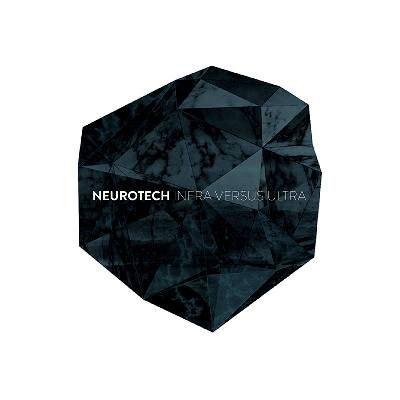 T.V.: Can we say it is self-cathartic?Wulf
T.V.: Can we say it is self-cathartic?Wulf: Absolutely! Music is the best way for that. Especially when people connect with things you are expressing through music or art in general. It's the same with me when I connect with other artists and their ideas. If your art touches somebody than this is the best thing, knowing that you are on the same wavelength with your listener is truly amazing.
T.V.: Let's go to a different topic. You are remaining loyal to the way of releasing music you started in the beginning. Self-releases, available as "name your price" digital download,...Wulf: Yeah, with this album I started for the first time a crowdfunding campaign for the release of physical CD. In this way I was allowed to offer more merchandise to
Neurotech fans. It couldn't work out in any other way to release the physical edition as well. I noticed that with such a campaign a lot more people could get involved in the making of album. Those who followed and supported the campaign knew many details about the album a month or even more before its official release. Supporters had an additional value to say so. The digital version is released as all other albums and releases by
Neurotech for free or "name your price" through Bandcamp. Those who don't know if they will like it or not can simply get it for free and I think this is the best way of releasing music these days.
T.V.: So, you are still not searching for a label?Wulf: Not at all! I think that this would be a complete nonsense, because I don't know how a certain label could help me. The only thing they could do to me is to put me in chains, by that I mean in the sense that they could only hinder me in my way of work. Being free I can simply say, ok I have a new song and I want it to release for Christmas and I do it. I don't think such a freedom would be possible with a label behind you. And with this crowdfunding campaign I realized that you don't need any kind of motor behind you. If people trust you and if you put a lot of effort in a certain thing then you simply don't need anything else.
T.V.: It seems that this campaign was really successful and I believe you will use this also in the future, won't you?Wulf: It was fantastic, I couldn't believe it. I learned a lot from it and it's good to know that you have devoted fans who stand behind you. Still, I can't say that I'll use crowdfunding campaigns for each and every future release.
T.V.: Acouple of days ago you mentioned that you are working on your first video clip. Can you say something more about it?Wulf: That's right! I think it will be for the song "The Longest Time", but don't take me for a word because I change my mind just like of a sudden. I was thinking to make videos also before, but somehow it never happened because of lack of money and time. Now it's for the first time that I've found the right people who can make it possible in the way that I want it. I don't want it to look like it was filmed on the phone, but I want a professional thing, made in a context I imagined it.
T.V.: Do you already have a screenplay for the video prepared?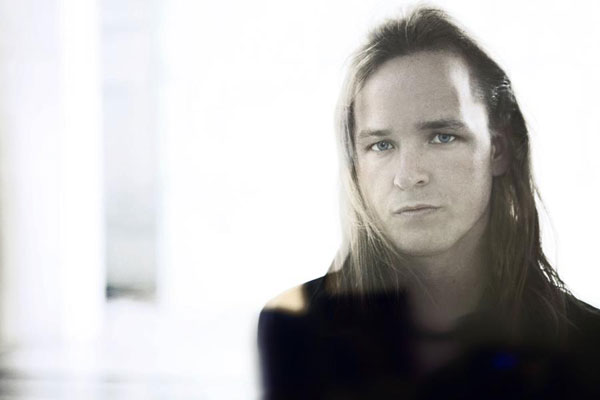 Wulf
Wulf: Yes I have, but I won't reveal it yet. Everything is still depending on a human factor, mostly on my brains, because I always leave many options open until the final realization.
T.V.: Our reviewer Ines wrote in the review of Infra Versus Ultra: "Electronic metal has its Mozart and his name is Wulf." Any comments?Wulf: Haha, it's very flattering, but I would never compare myself with him. Still it's very good to hear when somebody appreciates your work, especially if you put so much time and work in one album like this one. If I had put
Decipher and
Antagonist together it was just a half of work compared to this new one.
T.V.: Almost one year ago you released a song named "The Elysian Symphony". It's a very complex song and I wonder how it was done and what brought you to a decision to make something like that?Wulf: The whole thing was done in a day and half to be honest. All of my songs are done on a piano, and also this one was started that way. The song or like I call it - a symphony, was growing and developing, I was adding many new segments into it... it was pretty much similar process just like on "Blue Screen Planet". I like to have some different things, not just usual song structures with refrains, etc, but something more experimental and complex, something extra, when you concentrate more on a composition and you force your brains to think in a different way, out of standard patterns. And soon there will be released another very extensive thing, it's almost done by now.
T.V.: Ok, can't wait for that, but if I return to "The Elysian Symphony"... If compared with "Blue Screen Planet" it contains much more elements from classical music in it...Wulf: That's because I become more experienced in this kind of compositions, how to harmonize things, how to write this kind of stuff. In such long songs you must know exactly what you are doing, because it can easily became boring and nonsensical. Like as those great composers were doing it 200 years ago, you must make it interesting. You must have kind of a duality between energetic and easy going parts and by doing all that the final result can have a feeling of being more complex, maybe more studious in a way.
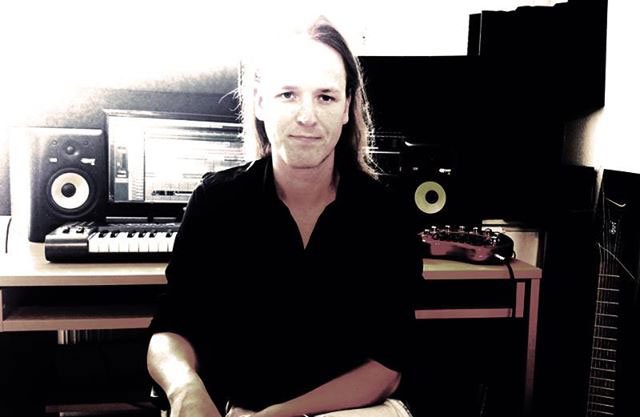 T.V. And as you mentioned it, in December there's another "symphony" waiting to be released - "The Halcyon Symphony"...Wulf
T.V. And as you mentioned it, in December there's another "symphony" waiting to be released - "The Halcyon Symphony"...Wulf: The rough idea for "The Halcyon Symphony" was to get the last 200 years of musical evolution into one extended body of work. From classical instruments and orchestration to early electronic music. From ambient to new age. From psy-trance to metal. I am not limited by any genre, they are not important to me, everything is music. I don't know whose quote this is but it says that there are only two types of music in this world. Good and bad. And I completely agree with that. The rest is really subjective and it's up to the listener to decide what works for them. "The Halcyon Symphony" btw will be released on Bandcamp for Christmas.
T.V.: If we return to yours just released album... Can you expose one or two songs from it that you like the most and mean something special to you?Wulf: Ok, I could say it for "The Longest Time", because it was the first. Otherwise the rest of the tracks mean to me pretty much all the same. Each track when it's in a working process is at that very time the best for you and you are very excited about it. I devoted the same amount of work and passion in every one of them. I'm proud of all of them just the same. Of course there are tracks that were made just to bring in front a certain atmosphere and to connect the tracks, but also those were made with the same purpose and passion. I can't really expose one or two tracks, because I look at it as an entirety.
T.V.: Can we say it's a proper conceptual album?Wulf: Every album of mine is in a way conceptual. Maybe
Antagonist wasn't a proper concept album because of some fillers and a couple of things weren't connected that well. I wasn't so skilled at that time in doing this things, but also that one had a red line, just like it was on
Decipher and it is on the new album.
T.V.: Unlike most of the bands from Slovenia, you've taken a different path in promoting yourself. Instead of trying to get as much as possible of recognition in your home country, you became much more popular abroad where I believe that every fan of electronic infused metal knows the name Neurotech. How's that?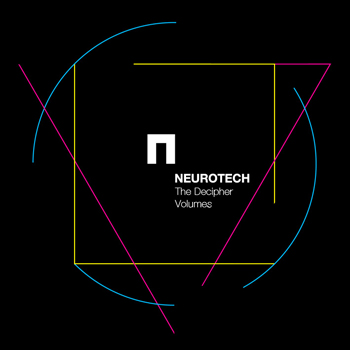 Wulf
Wulf: This kind of music has a very little base of potential listeners in Slovenia. I promote myself the same all over the world and don't make any differences between countries. I don't focus
Neurotech to a specific region, for example on German or French market, for me all the world is the same. But of course, soon you discover where more people like your music and in my case that is in France, UK, Germany, Finland, USA and Russia. Unfortunately I don't have a lot of fans in Slovenia, and even if it's my home market I look at it just as on any other. Some will like you and some will not, and I'm completely ok with that.
T.V.: Neurotech didn't play so many live shows for now, but there was one on MetalDays Festival this year that got quite a lot of attention, but you've also experienced some very bad luck...Wulf: This was a really special experience. To be honest, with the exception of the very first show we played in Klagenfurt (Austria), I had a bad luck on almost every other gig. This year on MetalDays, after two songs we had to finish the set because the hard drive broke. Anyway the response from people who attended the show was very good. But what concers the future plans for playing live there are none, mostly because the new album is a very specific one and I don't think it can be that easily played on stage. It has a lot of things done in the studio, especially regarding the vocals, synths, etc, so everything I could do is to press play on the laptop. I'm thinking how to represent this new album on another level, but it's too soon to talk about that.
T.V.: Who are the live-members of Neurotech now? Are those the same guys you had before?Wulf: There's the same bass player since the beginning. The dummer was there in the beginning and then left for some time in 2011, now he joined again. I have a new guitarist who joined us on stage. Those guys are all good colleagues of mine and we get pretty well along together. They are all skilled musicians and can play my songs with ease.
T.V.: Now everything regarding the production, mix and mastering is done on your own...Wulf: It was always like that, except the fact that before I recorded some vocals in a studio where I worked a full-time job, it was kind of post-production studio for commercials. Otherwise everything was always done by myself in my room.
T.V.: And you are some kind of an example that there's no need for big studios and resonant names behind the buttuns to achieve good sound. Where have you mastered all this?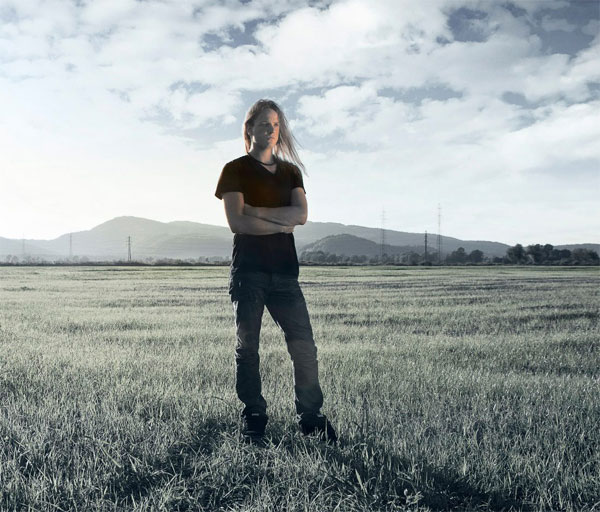 Wulf
Wulf: In 2007 I matriculated in the SAE institute here in Ljubljana, this is a school for audio engineers and I learned quite a lot there. But to be honest since I finished the high school I knew what I want to do in my life and soon after I started with
Neurotech.
Neurotech was in the beginning kind of a rabbit test for all what I wanted to try. To say the truth most of the things I learned by myself through the years, everything is in practice. I fucked up many things in those early years and that was the best school for me. There's of course a lot of work to be done before you achieve the right thing.
T.V.: You've had kind of an interesting experience while recording the new album...Wulf: That's right. In the time I was recording
Infra Versus Ultra the facade on the apartment building where I live was renewed. You can't imagine how much noise there was and I was searching for every minute of silence and tried to take advantage of those in the best possible way, haha.
T.V.: So, maybe that added kind of an additional value to the atmosphere of the album. Ok, Wulf, I think we covered pretty much everything. Thank you for taking the time for this interview and what would you like to say to your fans at the end?Wulf: Thank you for the interview and big thanks to all of my fans and friends for their support over the years. All the best!
Neurotech links: Official website, Facebook, Bandcamp, YouTube


 I think that our readers don't need any special introduction into one of the best and most successful, yet most creative atmospheric/electro/cyber metal acts of today - Neurotech. This one-man band coming from Slovenia just released its third full-lenght opus entitled Infra Versus Ultra (read a review over HERE), which once again goes beyond everything done before in the sector of electronic infused metal. By not being really concerned about how the fans will accept his new creations, Wulf, the mainman behind Neurotech is a master in making his music enriched with many different elements that have its origins in futurepop, symphonic music, new age, industrial and even in extreme metal. Neurotech was born back in 2007 and since then made all of his releases available as "name your price" digital downloads at Bandcamp, of course all three full-lenghts have been released also on CD. I meet with Wulf on a very cold day in one of the Ljubljana's bars where while siping coffee, smoking cigaretes and trembling because of coldness, we talked about the new album, future plans, inspirations, live experiences and much more.
I think that our readers don't need any special introduction into one of the best and most successful, yet most creative atmospheric/electro/cyber metal acts of today - Neurotech. This one-man band coming from Slovenia just released its third full-lenght opus entitled Infra Versus Ultra (read a review over HERE), which once again goes beyond everything done before in the sector of electronic infused metal. By not being really concerned about how the fans will accept his new creations, Wulf, the mainman behind Neurotech is a master in making his music enriched with many different elements that have its origins in futurepop, symphonic music, new age, industrial and even in extreme metal. Neurotech was born back in 2007 and since then made all of his releases available as "name your price" digital downloads at Bandcamp, of course all three full-lenghts have been released also on CD. I meet with Wulf on a very cold day in one of the Ljubljana's bars where while siping coffee, smoking cigaretes and trembling because of coldness, we talked about the new album, future plans, inspirations, live experiences and much more. Wulf: There are a lot of new things. First of all there's the sole atmosphere thing. I used a lot of software editions of sounds from the late 70s, early 80s, mostly from pioneers of electronic music like Jean Michel Jarre, Vangelis, but to be honest those two were my huge influences also before. I began with new approaches how to compose the songs, there was a lot of experimentations, still sometimes I used those standard compositional patterns because I like the songs with good refrains and verses with kind of pop attitude, but everything is done on a higher level now. The new album is made like a totality, even those songs that are completely diverse from anything I've done before are well integrated into the structure of the album. The most interesting thing is that there are no more harsh vocals, mostly because I don't listen anymore to that kind of music and I think that in the music I make today harsh vocals don't fit anymore. There was a lot of work just on that, to create harmonized vocals and by that adding a whole new dimension to the songs.
Wulf: There are a lot of new things. First of all there's the sole atmosphere thing. I used a lot of software editions of sounds from the late 70s, early 80s, mostly from pioneers of electronic music like Jean Michel Jarre, Vangelis, but to be honest those two were my huge influences also before. I began with new approaches how to compose the songs, there was a lot of experimentations, still sometimes I used those standard compositional patterns because I like the songs with good refrains and verses with kind of pop attitude, but everything is done on a higher level now. The new album is made like a totality, even those songs that are completely diverse from anything I've done before are well integrated into the structure of the album. The most interesting thing is that there are no more harsh vocals, mostly because I don't listen anymore to that kind of music and I think that in the music I make today harsh vocals don't fit anymore. There was a lot of work just on that, to create harmonized vocals and by that adding a whole new dimension to the songs. T.V.: And right with the release of Decipher Vol.2 many of your older fans were lost, but at the same time you've gained a lot of new ones. How do you look at this things?
T.V.: And right with the release of Decipher Vol.2 many of your older fans were lost, but at the same time you've gained a lot of new ones. How do you look at this things? better future. So, we have the three times, past, present and future, which is in a kind of connotation with the title Infra Versus Ultra; Infra like below or past, versus as the present and Ultra like beyond or future. All three times are connected between them and it's upon each and every one of us how to deal with them, what kind of decisions we will make out of all those experiences, memories and all the things that happened to us, how we will go into the future with all of that... This are the lyrical thematics on which this album is centered about.
better future. So, we have the three times, past, present and future, which is in a kind of connotation with the title Infra Versus Ultra; Infra like below or past, versus as the present and Ultra like beyond or future. All three times are connected between them and it's upon each and every one of us how to deal with them, what kind of decisions we will make out of all those experiences, memories and all the things that happened to us, how we will go into the future with all of that... This are the lyrical thematics on which this album is centered about. T.V.: Can we say it is self-cathartic?
T.V.: Can we say it is self-cathartic? Wulf: Yes I have, but I won't reveal it yet. Everything is still depending on a human factor, mostly on my brains, because I always leave many options open until the final realization.
Wulf: Yes I have, but I won't reveal it yet. Everything is still depending on a human factor, mostly on my brains, because I always leave many options open until the final realization. T.V. And as you mentioned it, in December there's another "symphony" waiting to be released - "The Halcyon Symphony"...
T.V. And as you mentioned it, in December there's another "symphony" waiting to be released - "The Halcyon Symphony"... Wulf: This kind of music has a very little base of potential listeners in Slovenia. I promote myself the same all over the world and don't make any differences between countries. I don't focus Neurotech to a specific region, for example on German or French market, for me all the world is the same. But of course, soon you discover where more people like your music and in my case that is in France, UK, Germany, Finland, USA and Russia. Unfortunately I don't have a lot of fans in Slovenia, and even if it's my home market I look at it just as on any other. Some will like you and some will not, and I'm completely ok with that.
Wulf: This kind of music has a very little base of potential listeners in Slovenia. I promote myself the same all over the world and don't make any differences between countries. I don't focus Neurotech to a specific region, for example on German or French market, for me all the world is the same. But of course, soon you discover where more people like your music and in my case that is in France, UK, Germany, Finland, USA and Russia. Unfortunately I don't have a lot of fans in Slovenia, and even if it's my home market I look at it just as on any other. Some will like you and some will not, and I'm completely ok with that. Wulf: In 2007 I matriculated in the SAE institute here in Ljubljana, this is a school for audio engineers and I learned quite a lot there. But to be honest since I finished the high school I knew what I want to do in my life and soon after I started with Neurotech. Neurotech was in the beginning kind of a rabbit test for all what I wanted to try. To say the truth most of the things I learned by myself through the years, everything is in practice. I fucked up many things in those early years and that was the best school for me. There's of course a lot of work to be done before you achieve the right thing.
Wulf: In 2007 I matriculated in the SAE institute here in Ljubljana, this is a school for audio engineers and I learned quite a lot there. But to be honest since I finished the high school I knew what I want to do in my life and soon after I started with Neurotech. Neurotech was in the beginning kind of a rabbit test for all what I wanted to try. To say the truth most of the things I learned by myself through the years, everything is in practice. I fucked up many things in those early years and that was the best school for me. There's of course a lot of work to be done before you achieve the right thing.